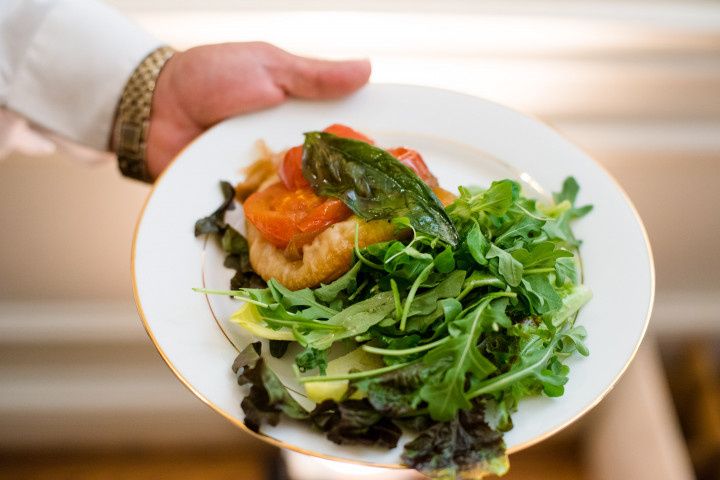4 Ways Wedding Planning Changes Your Brain
Yes, "wedding brain" is totally real. Turns out planning a wedding can actually shift the chemicals in your brain—here's how.

Falling in love with the right person undeniably changes you. Not only do you feel more supported and cherished but there is a certain ease that comes with knowing you have a partner who will be by your side through the good, the bad and the in between. But while there are many wonders of a lifelong relationship, the moment you introduce wedding planning into the mix, things change, yet again. And probably more ways than you realize. The mere act of a super-stressful experience (ahem: booking a venue, choosing a caterer, figuring out dress fittings, bargaining with florists…) actually shifts the chemicals in our brain. So if you normally you’re even-keel, and these days, you find yourself suffering from anxiety, rest easy: it may be normal.
Here, we chatted with a brain expert to discuss these fascinating shifts.
Wedding planning may make you hyper-focused — and a little cranky.
You know the feeling when you’re in the zone: everything is flowing smoothly, you’re rattling through your checklist at warp speed and you’re feeling fulfilled by your productivity. When you have far too many things to finish — like in wedding planning — you may find a somewhat superhuman stamina, according to triple board-certified clinical and forensic neuropsychologist and author, Dr. Judy Ho, PhD. You can compare this strength to what happens when you’re under pressure at work on a deadline, or when you are so busy, you can’t pause to binge watch Netflix, so somehow, you finish everything.
On the downside of this newfound skill is what happens if you get interrupted. Dr. Ho explain if your partner (or a friend or parent or…) asks for your attention, you may get instantly cranky — and perhaps, even a bit irrationally so. If taken to the extreme (say, when you only have an hour to get invites out to save 20 percent), Dr. Ho says it could lead to temporarily lower EEG activity, which is what you might see in adults with ADHD who have ‘hyperfocus’ symptoms. “It makes it hard to shift gears to take up necessary chores, work tasks, anything that might take you away from wedding planning,” she adds.
Wedding planning creates decision fatigue.
The first choice in wedding planning was an easy one: “Yes, we should get married!” But what many engaged couples don’t realize is how tiring the choices will become over months — or even a year or more — of planning. In fact, Dr. Ho says research suggests the average person switches gears from one thing to another more than 300 times per day during work hours. But when you add on taking quick calls or scheduling errands to check off prenuptial duties, that number raises even higher. “This much task switching picks apart your focus and can decrease your willpower, leading to decision fatigue,” she explains. “When this happens, your cognitive capacity to emotionally regulate or make important decisions gets worn down, and you start to act more haphazardly and experience burnout.”
So, if you are constantly on each other’s nerves because no one can figure out what to serve for dinner, rest easy. You’re likely just both mentally exhausted, and should probably just order takeout sushi.
Wedding planning boosts your mood.
Though much of the mental shifts feel a little, well, scary, there are some emotional benefits of wedding planning. And of course, a happy impact on your mood. Sure, it is expensive booking every last detail for your big day, but with each decision, you are imagining this special time with your one-and-only. After all, at the heart of a wedding is a marriage, and Dr. Ho says many people will find joy and increased levels of excitement through wedding planning, as they imagine a special future together. It also provides reassurance for your obsessive mind, knowing that the details are set in place, and you’re prepared for whatever may come your way.
Wedding planning will be remembered rose-colored.
During the year you planned your wedding, you pulled at least ten all-nighters. You have approximately four breakdowns, where you cried and screamed and were so overwhelmed, you couldn’t handle it. You bickered with your parents, your in-laws to be, and of course, that person who is about to be your spouse. You also feel extra angst from work and worried you were dropping the ball on your friendship. The wedding pressure, on top of also having a normal day-to-day-life, was too much to handle and the balancing act never quite felt equal. So, now that your date is coming up, do you worry about what you’ll remember about this time? Maybe — but you shouldn’t, according to Dr. Ho, who says most of the time, people recollect the event as even happier and more wonderful than it was in reality. In part, this is how our brain protects us from fatigue and sadness. It’s also along the same lines of thinking back to your high school days with reverie, rather than remembering how left out you felt at times. And the same experience that happens with women, since they are able to go through the pain of childbirth many times, thanks to their bodies, who produce chemicals that bond them with their babies.
Bottom line? You may feel a little out of sorts while wedding planning. But a few years from now? Or even a few months? You’ll still think about the experience as one of the best times of your life.





